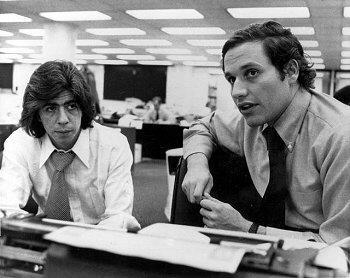
This Sunday, 40 years ago, five people were arrested for trying to break into the Democratic National Committee’s headquarters, located in the Watergate complex in Washington D.C. The incident started the infamous Watergate scandal that led to Richard Nixon’s resignation in 1974.
At the time, the FBI was quick to discover that the intruders were not just regular burglars – there was not much to be taken from party headquarters anyway. The connection between the arrested men and the Republican presidential campaign began to emerge as soon as the investigation started. The story quickly unraveled, its strings steered towards the White House and ignited the most notorious political thriller in American history, which raged for two years.
The story may not have meant so much to Americans if it weren’t for Bob Woodward and Carl Bernstein, two young journalists for the Washington Post whose persistence and enthusiasm fed new revelations published in the newspaper week after week. Their main source, nicknamed Deep Throat, was finally revealed a couple of years ago: then FBI Associate Director, Mark Felt.
Everything about Watergate is unique. Today, we know almost the whole truth about the criminal activity ran by the executive branch under the direction of a president elected by the American people by a landslide. We know about the eavesdropping, about the way political opponents and media representatives had been intimidated, and about the type of pressure put on prosecutors and investigators in an attempt to cover up information that would tarnish the image of the White House resident. Most of the Watergate facts are solid proof of the corrupting capacity of political power, as well as of the danger of having a president who suffers pathological paranoia.
After Watergate, Americans’ trust in the White House and political authority shrank. After Watergate, it became acceptable for the media to attack the president in an aggressive manner – something that had been unconceivable at the time of John F. Kennedy and Lyndon Johnson. It wouldn’t be far from the truth to say that the lack of outspoken investigative journalism allowed the two mentioned above to make two serious mistakes – one in the Bay of the Pigs in Cuba, and one in the Gulf of Tonkin in Vietnam.
Or maybe that’s just an illusion. Maybe those in power just have their ways to do what they want; the dogs bark, but the caravan goes on. Sometimes, left alone, the dogs don’t even bark. Major American media served as cheerleaders to the Bush-Cheney orchestra in March, 2003, when the U.S. was thrown into another misjudged affaire: the war in Iraq.
Any American journalist you ask would point to Watergate as the gold standard of the media’s role in democracy. If you watch “All the President’s Men,” with Dustin Hoffman playing Bernstein and Robert Redford as Woodward, you will be inspired.
These same journalists, however, would also tell you that times have changed and what happened with Watergate could not happen today. Unfortunately, it is doubtful that the integrity of those in power has ameliorated, and the methods used to deceive have surely been refined. The media, which is supposed to keep an eye on the actions of the political elite, is not preoccupied with these matters and is somewhat reluctant to invest resources in investigative assignments. Media audiences also suffer from an inability to focus on serious issues, jumping from one topic to another – the shallower, the better.
In the years after Watergate, Bernstein published brilliant biographies of Pope John Paul and Hillary Clinton. Woodward has remained super productive, launching a new book every two years. As a rule of thumb, their titles have topped the bestsellers list, but the fuss about them quickly fades away.
Regardless of the methods it uses, the most important attribute of a journalistic investigation is to reveal the truth. Bernstein and Woodward have proven themselves in this respect.
If someone at a high level is upset, it usually means the writer has hit a weak spot. David Sanger’s “Confront and Conceal” has likely done so, based on the reaction to this description of secret operation Olympic Games. Senators and Congressmen have demanded an FBI investigation on Sanger’s source of information. It looks like Deep Throat has said too much again.

Leave a Reply
You must be logged in to post a comment.